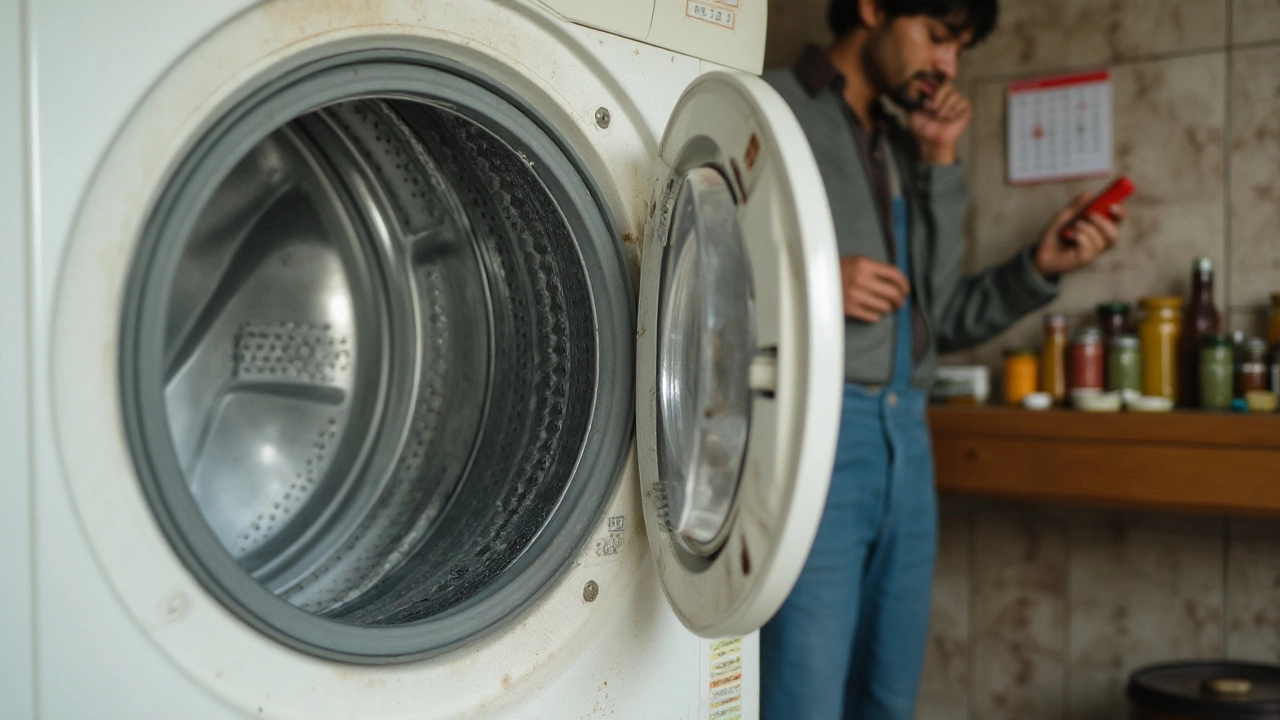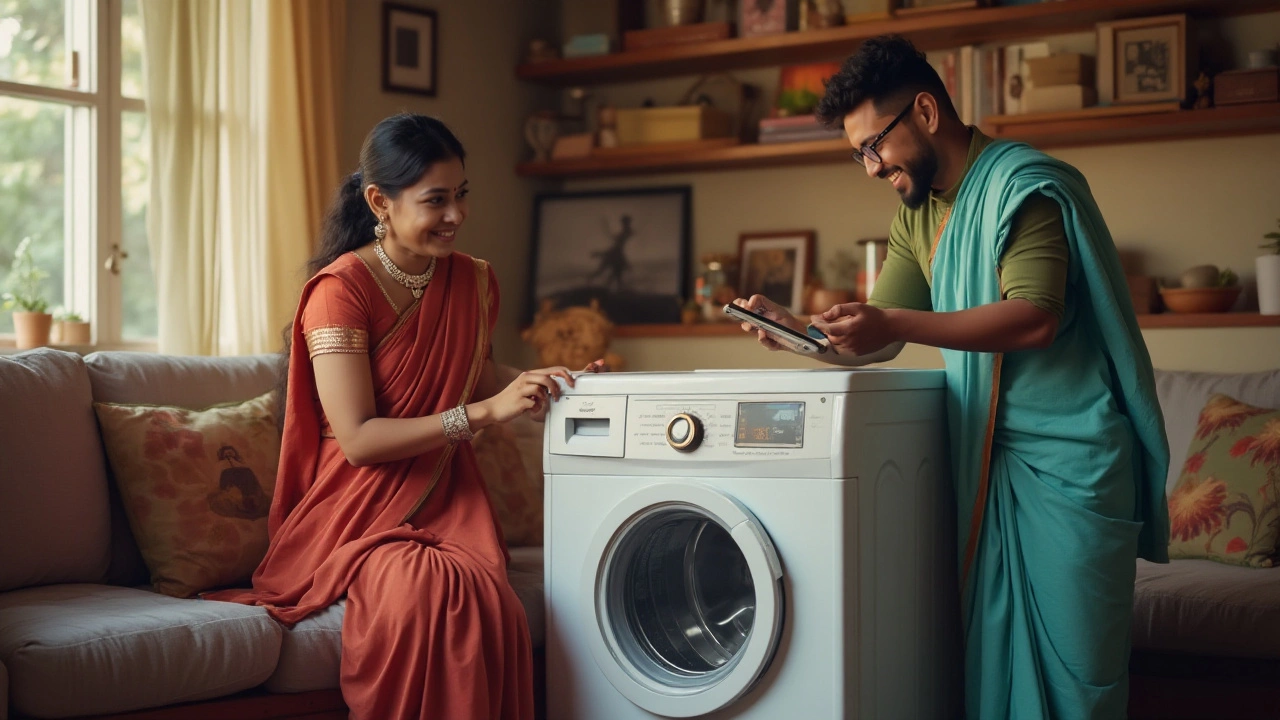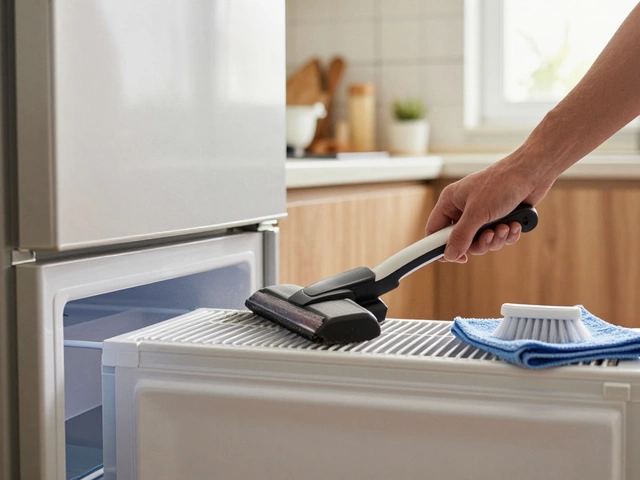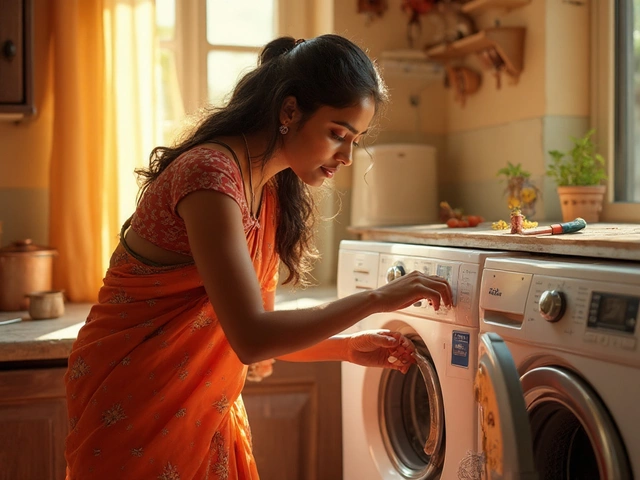Washing machines are a household staple, tirelessly churning through loads of laundry week after week. But when they hit that seven-year mark, you might find yourself pondering whether it's worth fixing them when they start acting up. Given the advancements in technology and energy efficiency, the decision can be a bit tricky.
Knowledge is power, and when it comes to appliances, understanding your machine's lifespan is crucial. By assessing common issues and weighing repair costs against replacement expenses, you can make a choice that keeps your wallet and laundry routine in check.
Add to the equation the environmental considerations of buying new versus maintaining existing machines, and you've got a full picture to consider. This article will arm you with the information needed to decide whether to breathe new life into your old workhorse or start fresh with a shiny new model.
- Understanding Washing Machine Lifespan
- Common Problems with Older Models
- Repair Costs vs. Replacement Costs
- Environmental and Cost Benefits
- Making the Decision: Repair or Replace?
Understanding Washing Machine Lifespan
When you invest in a washing machine, you expect it to serve your household for many years. On average, washing machines are designed to last about 10 to 15 years. However, multiple factors can influence this lifespan, including frequency of use, maintenance habits, and the specific brand or model. Typically, a higher-end machine might stretch into the upper end of that range, while more budget-friendly options tend to approach the lower end sooner. Quality and construction play key roles, where machines with solid, durable motors and high-quality components generally outlast their cheaper counterparts.
It's not just the physical design and components that matter; the usage patterns also significantly impact a machine's longevity. Overloading the drum, using harsh detergents, and improper installation can damage parts over time. Regular maintenance, like cleaning out lint filters and checking hoses, can help keep your machine running smoothly. Some experts, like those at Consumer Reports, suggest replacing machines older than eight years unless they're higher-end models or have been meticulously maintained. As one maintenance specialist once advised,
'Regular tune-ups can sometimes add years to a washer's functional life.'>This illustrates how vital routine checks are for prolonging appliance life.
Another important aspect in evaluating the longevity of washing machines is technological obsolescence. As technology evolves, newer models offer enhanced energy efficiency, better detergent use, quicker cycles, and even smartphone connectivity. These advancements can be tempting and might make an older model seem inadequate long before it physically wears out. However, if your seven-year-old machine runs efficiently and meets your needs, and repair costs remain reasonable, it might still have useful years left.
An interesting fact to note is that consumer surveys in Canada and the broader North American market often show a distinct pattern: people choose to replace their washers around the seventh or eighth year primarily due to perceived efficiency rather than mechanical failings. In fact, some brands, like Speed Queen, even boast about the durability and prolonged lifespan of their machines compared to standard market predictions. This creates a complex decision-making process where functionality, economy, and sustainability intersect.
In conclusion, understanding washing machine lifespan involves balancing these facets: the initial build quality, maintenance routines, frequency and manner of use, as well as evolving technological amenities. Before deciding on repair or replacement, consulting a seasoned appliance technician can also be incredibly beneficial. They can provide insights specific to your machine’s condition and predict upcoming needs. Equipped with this knowledge, you’ll be more adept at making a decision that aligns not just with immediate needs but also with long-term household and environmental considerations.
Common Problems with Older Models
Seven-year-old washing machines, while often still in good working order, do tend to develop quirks over time that might require attention. One of the most pervasive issues is wear and tear on components, leading to leaks or noisy operations. The drum bearings, for instance, might start to fail, causing a loud grinding noise during spin cycles. This issue not only disrupts peace but can signal further degradation if not addressed quickly. Replacing bearings can be costly, and many wonder if it's judicious to do so or upgrade to a newer machine. If you’ve ever stayed awake listening to a rattling washer, you know how disruptive a worn bearing can be.
Another frequent problem with older washing machines is the malfunction of the electronic control boards. Because control boards govern so many aspects of the wash cycle, any glitch here can throw the whole machine off balance. You might encounter irregular wash cycles, unexpected stops, or issues with water temperature settings. Repairing these boards might be an option, but not always cost-effective; sometimes whole boards need replacement.
As appliance technician Mike Sanders puts it, "If your washer can't interpret 'spin,' it's probably time to save for a new era of washing convenience."However, diagnosing whether it's truly the board or just a loose wire can be key.
Water-related issues are also notorious with older washers. From faulty water pumps that struggle with drainage to inlet valves not opening properly, these issues can lead to water pooling in the drum or, worse, on your floor. Mineral deposits from hard water can clog hoses and valves, making regular maintenance essential. Contrary to some beliefs, running a descaling agent through an empty cycle occasionally can vastly improve longevity and functionality, a small investment for potentially large savings.
Sound and Spin Woes
Spin-related problems often tie into balance issues. As machines age, their suspensions may weaken, leading to off-balance loads that can make the entire appliance vibrate or 'walk' during cycles. This not only affects washing efficiency but can also damage your laundry or the machine itself if left unchecked. Balancing kits are available, but they may serve as a band-aid rather than a cure. Understanding your machine's limitations and avoiding overloading can prevent some of these issues.
In terms of fixes, sometimes straightforward solutions exist. For example, considering soundproof mats could dampen noise and stabilize excessive movement, extending your machine’s usable life. Yet, it’s pivotal to weigh the cost of continual repairs against potential savings from modern, energy-efficient models. In Canada, the average lifespan for a washer is around 11 years, yet many components involve each having unique longevity. As these components start to falter, you'll inevitably reach a tipping point of repair cost versus buying new. Tables containing a comparison of repair vs. replacement cost for various parts can serve as a helpful reference, ensuring that homeowners are making informed decisions when the inevitable first repair need arises.

Repair Costs vs. Replacement Costs
When your washing machine starts acting up, it’s natural to consider if repairing it makes sense or if it’s time to replace it entirely. The decision often boils down to comparing the estimated repair costs against the price of a new machine. For machines around the seven-year mark, this can be particularly tricky, as their depreciation and reliability weigh heavily on the decision.
On average, the lifespan of most washing machines tends to hover around 10 to 14 years. If your machine is failing at seven years, it could simply be due to wear and tear or perhaps a more serious malfunction. Costs for repairing generally depend on what’s gone wrong. For instance, replacing a drum or motor can be pricey, running anywhere from $200 to $500. Smaller repairs such as a broken belt or a door seal are less expensive, but still not inconsequential.
Conversely, the price of a brand new washing machine varies based on brand, features, and size. Basic models can cost as low as $500, while high-end machines may exceed $1,500. As you balance the upfront price of a new machine with repairs, it’s crucial to consider energy efficiency. Newer models often use significantly less water and electricity, which can save money in the long run. This trade-off might justify an initial larger investment if current repair estimates are high.
Many experts suggest the 50% rule: If the repair costs are 50% or more of the price of a new machine, it might make more sense to replace it. But there are exceptions. If your machine is a high-end model barely outside warranty, repairing could still be economical given its longer potential lifespan. According to Consumer Reports, "investing in quality repairs can extend the life of your machine and delay the need for a replacement," which could be quite beneficial for premium models.
Consider also the financial strain of a replacement. While spreading the cost over payments might be an option for some, others might find an immediate repair less financially stressful. There may also be rebates for energy-efficient appliances, which can sweeten the deal when upgrading. On the flip side, maintenance tends to add up over time. Consistently repairing an old machine might end up costing more than a new purchase in the long term, particularly if the machine has already required several fixes.
Let’s break it down with a look at potential costs:
| Repair Type | Approximate Cost |
|---|---|
| Motor Replacement | $300 - $500 |
| Drum Repair | $200 - $400 |
| Belt Replacement | $100 - $200 |
| Door Seal | $80 - $150 |
| Overall Diagnostic | $75 - $100 |
Budgeting for these choices requires thoroughly assessing both the current state of your washing machine and future use. A holistic view of costs—both immediate and recurring—ensures that whichever option you choose, it’ll align best with your financial and household needs.
Environmental and Cost Benefits
When pondering the fate of a washing machine that has been loyally spinning for seven years, one must consider the environmental and financial ramifications of keeping it or bidding it farewell. On the environmental side, repair can be seen as an act of conservation, reducing waste and maximizing the lifespan of an appliance that’s potentially still operational. Disposing of a washing machine contributes to the growing issue of electronic waste, which is an environmental nuisance due to the toxic substances that, if not disposed of correctly, can seep into our ecosystems. Economist Janice Silverman states, "Repairing appliances can significantly reduce carbon footprints, as a new product’s manufacturing and transportation have a considerable environmental impact." Thus, by opting for the repair route, owners are effectively contributing to a more sustainable world.
On the cost-benefit side, the decision is similarly multifaceted. A simple repair, often tackling common issues such as faulty belts or pumps, can be financially advantageous, as new machines, especially those with higher technology integration and energy efficiency features, come at a steep price. Additionally, repair costs can be nominal compared to the sticker shock of a new appliance. Experts generally suggest that if the repair costs are less than half the price of a new machine, repairing is generally the economically sound choice. A notable habit among economically-savvy homeowners is to maintain a yearly budget for minor appliance repairs, which can preempt the need for significant expenditures when something goes awry.
To illustrate these benefits further, let’s consider how your choice affects both the environment and your financial standing on a broader scale. A family deciding to repair their older machine could actually be saving thousands over the long term, sparing them the continuous cycle of buying, disposing, and buying again. There is also the added advantage of not needing to learn the quirks of a new machine — sticking with the devil you know, so to speak. The financial and environmental dividends, although perhaps not immediately visible, do add up to offer a cleaner planet and a healthier bank balance.
Here's a closer look at some possible savings below:
| Scenario | Cost Savings |
|---|---|
| Repair vs. Replace | Up to $500 |
| Energy Efficiency Differences | Annual Savings of $100 |
| Environmental Impact | Reduced CO2 Emissions by 50% |
Faced with these compelling reasons, it becomes clear why repair could be the greener and more wallet-friendly route. Weighing in both repair costs and the potential savings in energy consumption over time, the choice leans heavily towards maintaining what current technology we have while being discerning consumers of new products. By opting to extend the life of your appliances, there’s also a palpable sense of satisfaction in deferring waste, serving personal budgets, and aiding the planet simultaneously — what’s not to love?

Making the Decision: Repair or Replace?
As your washing machine reaches its seventh year, you might be standing at a crossroads, wondering if you should fix the old faithful or usher in a new era with a replacement. Before jumping to conclusions, it helps to delve into the economic and environmental impacts of both options. Consider that the average lifespan of modern washing machines is about 10 to 13 years, as reported by consumer studies. If yours lands in the middle of this range, it's wise to perform a thorough assessment of its current state.
Now, let's talk numbers: repairs on a washing machine that is seven years old can range significantly, anywhere from a mere $100 to about $300, depending on the issue. Common troublemakers like a faulty motor or a broken seal won't just cost you money, but they might become frequent guests if you're unlucky. When repair costs start edging towards half the price of a new machine, experts suggest considering a replacement instead. Bear in mind, modern machines come with enhancements in energy efficiency, potentially making them cheaper to operate and easing their impact on your utility bills over time.
Environmental Considerations
Swapping your old machine for a new one might seem alluring, especially when lured by the promise of the latest technology and improved efficiency. However, there's a growing dialogue about sustainability and the environmental footprint of manufacturing new appliances. According to Environmental Protection Agency (EPA) reports, reducing waste by extending the life of your appliances can notably diminish landfill load and conserve resources needed for production. Deciding whether to repair your machine can thus become a decision with environmental weight. Choose wisely, knowing that every action has a broader impact.
Value Beyond Cost
Money isn't the only factor when you're weighing these options; time and convenience matter too. Frequent repairs can spell frustration—time you might rather spend on, quite literally, anything else. Replacement gives you the bulwark of a warranty, offsetting the unpredictability of future repairs for several years to come. That said, if the trusty warrior still spins without hitch more often than not, an occasional fix can keep it soldiering on for years to come. Ultimately, the choice reflects a balance of financial, personal, and environmental values specific to you. Remember the purpose of the machine is to serve you, and if it fails more often than not, it might be time to say goodbye.
"The great benefit of new technology is that it can make life easier, but only when it's working as it should," says Tech Review's new appliances editor. "The constant balance between innovation and reliability is key for household decisions."
When all is said and done, relying on your needs, budget, and environmental considerations to inform your decision will help guide you in the right direction. Whether to repair or replace your washing machine is ultimately your choice, but arming yourself with all the facts ensures it’s an informed decision that meets your household dynamics.



